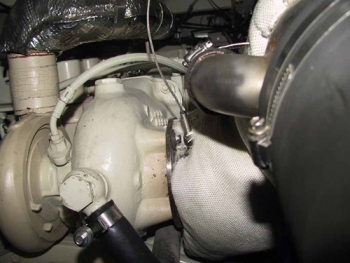MVDirona.com |
||
|
|
|
 |
|
Diesel Engine Overload: Restricted Air Intake?
James:
I just read your tech tips about overloading diesel engines. It sounds like you are describing my dilemma.
I do not feel I run my engines hard. But every day back at port after the fishing day, my deckhand has to scrub like mad to get that stubborn black soot off the transom. I even have a fairly new Awlgrip paint job, bright white so it really gripes me everyday for the extra work to keep the boat looking beautiful. My engine is apart now and the mechanic found a valve seat that was not working properly, that is why we could hear the ping noise out the exhaust. When we get things back together after the repair we plan to do new sea trials under the more realistic conditions that you also elude to in your article. I am also expecting not to reach full RPM at WOT. The props will then be repitched accordingly.
The manufacturer specs say these engines require 950 cubic ft/min of air per engine. Also that the square inches of opening for air to the engine space to be 250. In my boat I have about 250 sq in total. I guess this would mean that I am actually supplying my space with just half the recommended air intake ????? What do you think about this?
So lately I have been trying to learn about blowers. I have found a company on the web that makes blowers for this application but there is still a lot of information I need to get from them. In addition to some small hull vents I have 2 main vents that go from engine room up through the cabin roof. These vents are 8 inch diameter galvanized pipe that are slid into a wooden, fiberglassed box basically. The reason for the metal piping I'm sure is to satisfy Coast Guard requirements.
Response: Yup,
restricted intake, whether it be engine room air shortage or dirty air filters,
absolutely can cause smoke. Fortunately, the engine room problem is an easy one
to test for. Do a sea trial with the engine room doors wide open (on a nice day)
and see if you get full RPMs. If you do, you need to chase the problem no
further and even if it isn't THE issue currently causing you problems, you do
need a good clear air supply and free flowing exhaust for your engines. Use the
test that I describe above to figure out if you need some prop work or just the
intake modifications will cover it.
Back to Diesel Engine Overload Introduction and Follow-up Questions
|
||
| Comments or questions? Feel free to contact us at Jennifer@mvdirona.com or jrh@mvdirona.com. |
Copyright 2012 Jennifer and James Hamilton |
|